
Trappist beer is brewed by Trappist monks. Thirteen Trappist monasteries—six in Belgium, two in the Netherlands, and one each in Austria, Italy, England, France, and Spain—currently produce beer, but the Authentic Trappist Product label is assigned by the International Trappist Association (ITA) to just ten breweries which meet their strict criteria. As of 2021, Achel is no longer recognized as a Trappist brewery because it does not have any living monks.
Scottish & Newcastle plc was a brewing company headquartered in Edinburgh, Scotland, which expanded from its home base to become an international business with beer volumes growing almost tenfold.

Alken-Maes is a Belgian brewery created out of the 1988 merger of two small breweries, Maes located at Kontich-Waarloos and Cristal-Alken located at Alken. It was bought by Scottish & Newcastle in 2000, who were taken over by Carlsberg and Heineken in 2007.
Kronenbourg Brewery is a brewery founded in 1664 by Geronimus Hatt in the Free Imperial City of Straßburg, Holy Roman Empire. The name comes from the area where the brewery relocated in 1850. The company is owned by the Danish multinational Carlsberg. The premium brand is Kronenbourg 1664, a 5% abv pale lager.

Duvel Moortgat Brewery is a Flemish family-controlled brewery founded in 1871 in Antwerp Province, Belgium. Its strong golden pale ale, Duvel, is exported to more than forty countries. Duvel is Brabantian, Ghent and Antwerp dialect for devil, the standard Dutch word being duivel. Other popular beers include Maredsous and Vedett.
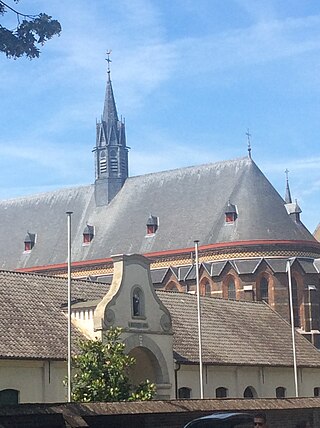
Achel Brewery or Brouwerij der Sint-Benedictusabdij de Achelse Kluis was a Belgian Trappist brewery, until January 2021. It continues to operate as a brewery but is no longer Trappist, as the brewing monks whose presence gave rise to that status have retired. It is located in the Abbey of Saint Benedict in the Belgian municipality of Hamont-Achel. It brews six "Trappist beers".

Westmalle Brewery is a Trappist brewery in the Westmalle Abbey, Belgium. It produces three beers, designated as Trappist beer by the International Trappist Association. Westmalle Tripel is credited with being the first golden strong pale ale to use the term Tripel.

Beer in Belgium includes pale ales, lambics, Flemish red ales, sour brown ales, strong ales and stouts. In 2018, there were 304 breweries in Belgium, including international companies, such as AB InBev, and traditional breweries, such as Trappist monasteries. On average, Belgians drink 68 litres of beer each year, down from around 200 each year in 1900. Most beers are bought or served in bottles, rather than cans, and almost every beer has its own branded, sometimes uniquely shaped, glass. In 2016, UNESCO inscribed Belgian beer culture on their list of the intangible cultural heritage of humanity.
The term dubbel is a Belgian Trappist beer naming convention. The origin of the dubbel was a strong version of a brown beer brewed in Westmalle Abbey in 1856, which is known to have been on sale to the public by June 1861. In 1926, the recipe was changed, and it was sold as Dubbel Bruin. Following World War Two, abbey beers became popular in Belgium and the name "dubbel" was used by several breweries for commercial purposes.

De Koningshoeven Brewery (Brouwerij de Koningshoeven) is a Dutch Trappist brewery founded in 1884 within the walls of Koningshoeven Abbey in Berkel-Enschot (near Tilburg).

Beer in the Netherlands mostly comprises pale lagers like Heineken and Grolsch. Heineken is the world's second-largest brewer.
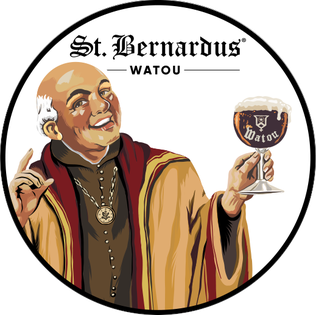
St. Bernardus is a brewery in Watou, Belgium.

Jumet is a town of Wallonia and a district of the municipality of Charleroi, located in the province of Hainaut, Belgium.
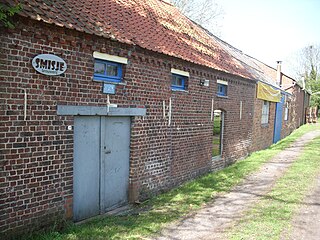
The Smisje Brewery, with a tiny production of only 200 hectoliters per year, is one of the smallest existing Belgian craft breweries. Begun in 1995 by former printer and homebrewer Johan Brandt, it was originally titled "De Regenboog", the same name as his earlier printing business. Brandt is also a bee-keeper, which accounts for the prominent use of honey in some of the brewery's offerings, including its first commercial beer, which was named 't Smisje or "the little blacksmith" to reflect the hand-crafted nature of the product as well as a local landmark blacksmith's house near the brewery's original location.
Brasserie de Brunehaut is the trade name for Brunehaut brewery, located in Rongy-Brunehaut (Hainaut), Wallonia, 80 km south/southwest of Brussels, Belgium, near the French border.

Huyghe Brewery is a brewery founded in 1906 by Leon Huyghe in the city of Melle in East Flanders, Belgium. Its flagship beer is Delirium Tremens, a golden ale.
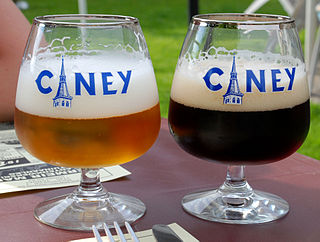
The Ciney is a Belgian beer native to town of Ciney.

Bosteels Brewery is a brewery in Buggenhout, Belgium. The brewery was founded in 1791 and was owned and operated by the same family. Bosteels brew three beers: Tripel Karmeliet, DeuS, and Pauwel Kwak. In 2019 a new beer was added for the first time in 17 years; Monte Cristo.
Herkenrode is a Belgian abbey beer brewed by the Cornelissen Brewery at Opitter in Bree, Limburg, named after the former Herkenrode Abbey in Hasselt.
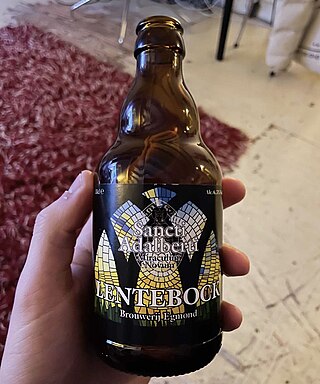
Brouwerij Egmond, also known as Sancti Adalberti is a Dutch brewery in Egmond aan den Hoef that is connected to the local St Adelbert's Abbey. The brewery brews abbey beer: part of the profits goes to the abbey.

















